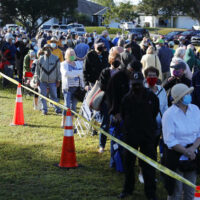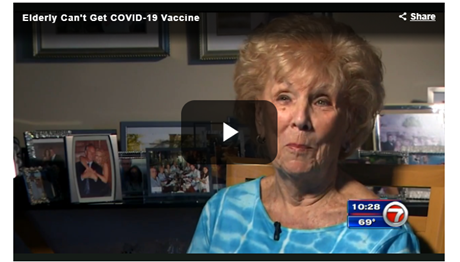Last in Line – COVID-19 Vaccine Distribution has Failed Seniors with Disabilities.

The distribution scheme in Florida is like announcing to a room of ravenous teenagers that their pizza delivery has arrived. Except, in Florida’s case, it’s a rush of senior citizens attempting to the few life preservers that are available. Some seniors could get the vaccine. These seniors have the time and ability to incessantly call and make an appointment, wait in line for hours, and have transportation ready and able to take a person and wait for them to get immunized. But this does not take into account the millions of seniors who do not have the ability, resources or assistance to jump through these hurdles to get the vaccine.
On January 22, 2021, Disability Independence Group filed a complaint with the United States Department of Health and Human Services to highlight the complete failure to provide access to the State of Florida’s vaccine program to persons with disabilities.
The Americans with Disabilities Act requires that persons with disabilities receive equal access to all programs and services of state and local government. The State of Florida or local governments cannot have a program or service that is not equally accessible for all of its citizens and need to make modifications to their programs so persons with disabilities can have the same access. The limitation on this duty is if the modification is a fundamental alteration or undue burden in view of all of the resources of the governmental entity.
Many seniors with disabilities cannot meet the demands of the government to get a vaccination. This includes the following:
- Because of physical issues, a senior may not be able to stand or wait in line for an extended period.
- Because of immunocompromised state, a senior may not be able to wait with others in line or go to a supermarket or pharmacy to obtain a vaccine.
- A senior may not have transportation to go to the vaccination point; or if it is a drive-through vaccination point, the car service (such as paratransit or Uber) is not going to wait in line to get the vaccination.
- Many vaccination programs require reservations made through the internet, and a senior may not have access or the knowledge on how to do so.
What makes matters worse is that there is no method to request an accommodation for a disability. While we are focused on seniors now, the same issues apply to many persons with disabilities who are not seniors.
Governor DeSantis’ #SeniorsFirst plan sent vaccines to the county Department of Health to distribute to hospitals and long-term care facilities. The Governor also noted that he is providing vaccines to staff and residents at 4,000 long term care facilities. Out of the over four million persons over 65 in Florida, only 70,000 reside in skilled nursing facilities. In addition, vaccines are going to be sent to Publix supermarkets and Walgreens or CVS pharmacies. Currently, there are lines of persons over 65 in front of testing centers, even when seniors get appointments. The drive to immunize through private entities, long term care facilities and condominiums where seniors reside omit immunizing seniors who do not live-in congregate living and those marginalized communities that do not have a local Publix, Walgreens or CVS.
The solution is not difficult and had been implemented for COVID-19 testing last year in Miami-Dade, Broward, and Palm Beach County, where person with disabilities could get testing in their homes. For voting in the general election in November, paratransit, Uber and Lyft, would transport seniors and persons with disabilities to the polls, where their voting would be expedited, and then they would be driven home. For purposes of vaccines, the procedures to accommodate Persons with Disabilities would include:
- Provide a method to request an accommodation, including an email and phone number.
- Provide information in a format other than internet based.
- Accommodation: Provide a fast-pass method to get a vaccine where the line is shorter, or it is appointment only.
- Accommodation: Provide a method where a person who is immunocompromised can obtain a vaccine and without waiting in line or going into a hospital or vaccination center (in car or outdoor vaccination)
- Accommodation : Contract with STS (Paratransit) or Uber/Lyft to deliver a person and wait for a person while they get vaccinated and wait for a reaction, and deliver them home.
- Accommodation: Provide in-home vaccinations.
Disability Independence Group filed the complaint after I was called by Help Me Howard, which is a legal help segment on WSVN-7. I was called to help Georgia Rogers, a 95-year-old woman from Lauderhill, who is immunocompromised, has edema in her ankles and has other issues that makes it difficult to sit or stand for an extended period of time. She can not stand or wait to be vaccinated and wanted her son to be able to bring her to a vaccination point to be given the vaccine, wait for the time for adverse reaction and be taken home. Because there are no formal methods to request accommodations for any of the COVID-19 vaccination procedures, I attempted to get an accommodation for her – just to ensure that she does not need to wait in line.
I was told that here was no method to accommodate disabled individuals over the age of 65 to be vaccinated. When I pressed for an answer, I was advised that Broward “County does not have possession or control over a single dose of the vaccine, nor does the County have the ability to control appointments, schedule appointments, or the order of who is vaccinated and when. The County will continue its discussions with the Florida Department of Health to provide additional avenues for disabled individuals over the age of 65 to be vaccinated.”
At the same time, I contacted Miami-Dade County to see what their procedures were to administer COVID-19 Vaccines. Miami-Dade currently has a program but is it not open to the general public of seniors with disabilities. They have recently deployed a mobile unit that will travel to central points to provide the vaccine.
There is no excuse why we are not providing equal access to the vaccine program for seniors with disabilities. By having a first come/first served regimen to vaccinate, and denying accommodations to the most vulnerable, this places persons with disabilities last.














